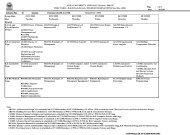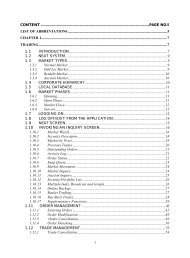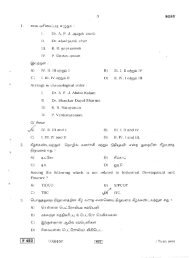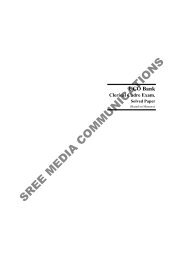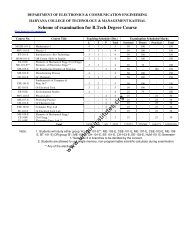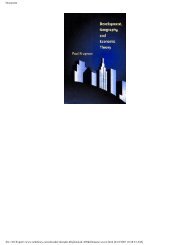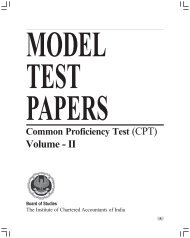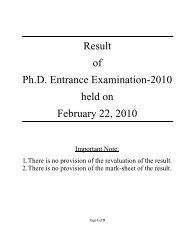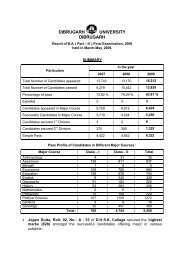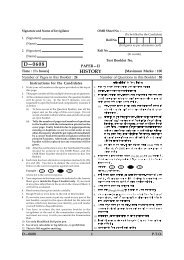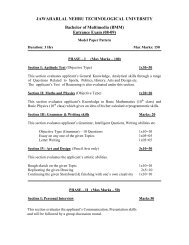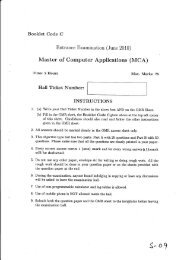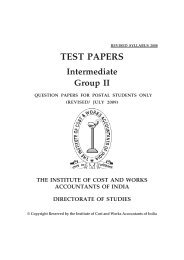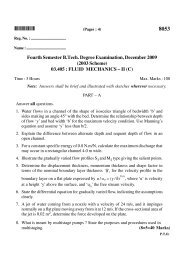UNIT – I Lesson 1 HRM – AN OVERVIEW Lesson Outline Nature of ...
UNIT – I Lesson 1 HRM – AN OVERVIEW Lesson Outline Nature of ...
UNIT – I Lesson 1 HRM – AN OVERVIEW Lesson Outline Nature of ...
Create successful ePaper yourself
Turn your PDF publications into a flip-book with our unique Google optimized e-Paper software.
TRADE UNION THEORIES<br />
Different answers are given to the question: what factors lead to the origin <strong>of</strong> trade unions?<br />
These answers are known as trade union theories or approaches to the origin <strong>of</strong> trade<br />
unions. Following is a brief description <strong>of</strong> some <strong>of</strong> these approaches:<br />
• Social- psychological approach <strong>of</strong> Robert Hoxie:<br />
Trade unions grow out <strong>of</strong> the socio-psychological environment <strong>of</strong> the workers.<br />
Workers, who are similarly situated economically and socially, closely associated<br />
and not very much divergent in temperament and training, tend to develop a<br />
common interpretation <strong>of</strong> their social situation and a common solution <strong>of</strong> their<br />
problems <strong>of</strong> living. This leads them to unite into a union. Thus differences <strong>of</strong><br />
environment cause different unions to develop.<br />
• Sociological approach <strong>of</strong> Frank Tannenbaum.<br />
Trade unions are the by-products <strong>of</strong> an industrial society in which customization<br />
has destroyed the old way <strong>of</strong> life and robbed the workers <strong>of</strong> his identity, purpose<br />
and creativity. Unions are a reflection <strong>of</strong> the worker’s spontaneous urge to reestablish<br />
his identity. Trade unions help the worker in regaining his social life.<br />
• Protest approach <strong>of</strong> Kerr, Dunlop and others.<br />
Trade unions is form <strong>of</strong> organized protest against the evils <strong>of</strong> industrialization.<br />
Besides bringing about a basic change in the relationships between man and his<br />
work and between man and his cultural setting, industrialization inevitably<br />
circumscribes workers freedom by imposing discipline. The worker <strong>of</strong>ten finds his<br />
work distasteful and his compensation never commensurate with his contribution.<br />
Formation <strong>of</strong> a union is one <strong>of</strong> the organized forms <strong>of</strong> protest <strong>–</strong> an expression <strong>of</strong><br />
the workers resentment over the prevailing industrial system.<br />
• Industrial democracy approach <strong>of</strong> webs<br />
Trade unions are the means to achieve industrial democracy. They assert that<br />
political democracy alone cannot yield to the worker the fruits <strong>of</strong> freedom <strong>of</strong><br />
contract, freedom <strong>of</strong> association, freedom <strong>of</strong> opportunity, etc. He can enjoy the<br />
fruits <strong>of</strong> political democracy only when he is granted industrial democracy, which<br />
means that he is given say in running the industry.<br />
• Classless society approach <strong>of</strong> Karl Marx<br />
Trade unions represent a prime instrument for destroying the capitalist class.<br />
Although these unions by themselves cannot bring about a class-less society still



